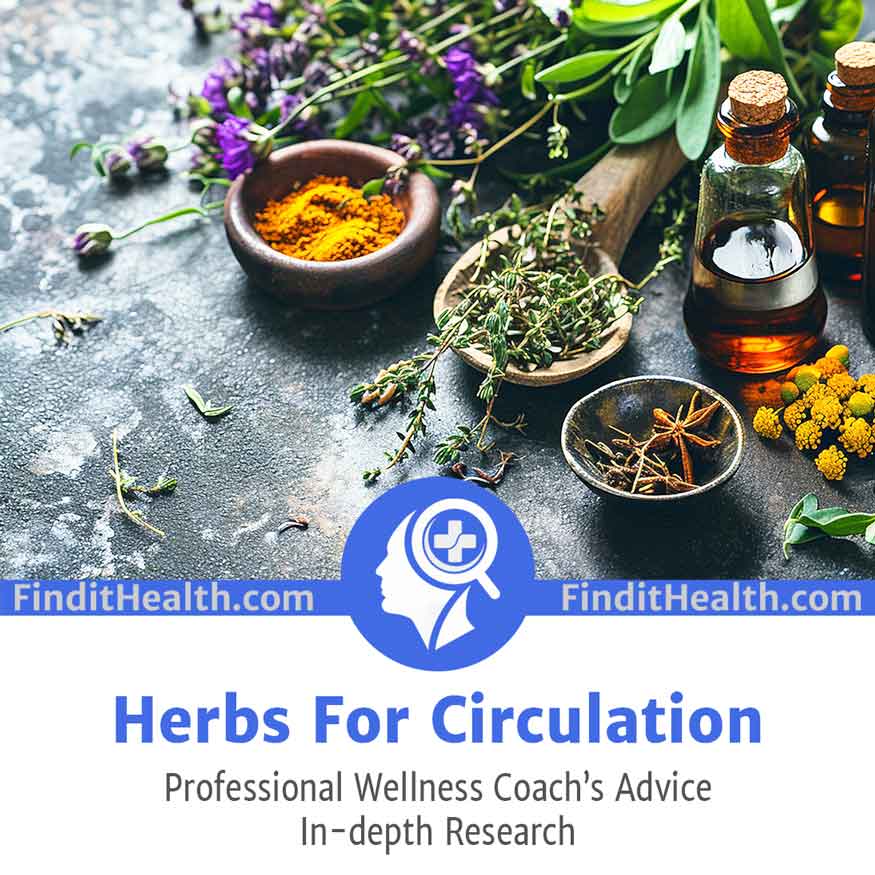
As the head of the wellness coach team at Find It Health, we’re committed to guiding you through the complex pathways of natural health. Backed by in-depth research, our team explores deep into the field of herbs known to bolster circulation.
When it comes to natural ways to enhance blood flow, herbs have always been a prominent choice in traditional healing practices. In this discussion, you will uncover the efficacy and role of various plants in promoting circulatory health. It is important to note that all of these recommendations must only be incorporated into your daily routines after being examined by a medical professional to avoid complications.
Recommended Herbs For Circulation
For circulation, specific herbs have proven to be particularly effective in aiding blood flow and addressing constricted blood vessels. Let’s break it down:
1. Ginkgo Biloba
- A classic herb known for its beneficial effects on the circulatory system, Ginkgo Biloba works by dilating the blood vessels. This facilitates a smoother flow of blood, particularly beneficial for those experiencing poor blood circulation in the extremities.
2. Cayenne Pepper
- While not typically thought of in the herbal medicine realm, cayenne is a powerhouse when it comes to promoting healthy circulation. Its active ingredient, capsaicin, aids in the expansion of blood vessels, thus improving blood flow.
3. Garlic
- A common household herb with surprising circulatory benefits. Garlic is known to combat heart disease by reducing the build-up of plaque in the arteries, promoting healthier blood vessels, and, in turn, improving circulation.
4. Ginger
- Apart from its digestive benefits, ginger plays a role in improving blood circulation. It has warming properties, making it especially beneficial for individuals with cold extremities due to poor blood circulation.
5. Hawthorn
- This herb supports the heart and blood vessels by strengthening the cardiac muscles and promoting blood flow. Its antioxidant properties further protect the vascular system from potential damage.
Circulatory issues can result in a variety of ailments, from varicose veins to heart disease. When blood vessels become constricted or blocked, they hinder the flow of oxygen-rich blood throughout the body.
Potential Complications
While herbal medicine holds significant promise in improving circulation, it’s essential to approach its use judiciously.
Always consult with a healthcare professional before introducing new herbs into your regimen, especially if you’re on medications or have pre-existing conditions.
Herbs vs. Lifestyle Changes
While these herbs can undoubtedly aid circulation, they are just one part of a holistic approach. Regular exercise, maintaining a balanced diet, and avoiding smoking are equally crucial for ensuring healthy circulation.
SUBSCRIBE for FREE STRESS MANAGEMENT TECHNIQUES from our EXPERT COACHES!
Effectiveness
The world of health and wellness is inundated with countless solutions, remedies, and therapies.
However, the measure of any treatment’s value rests on a singular pivotal component: its effectiveness.
How well does a solution address the problem it claims to solve? This is how it works:
Assessing Herbal Effectiveness
Herbs have been part of human healing practices for millennia. Their effectiveness can be ascertained through:
- Historical Use: The long-standing use of certain herbs across cultures provides anecdotal evidence of their potential benefits.
- Clinical Studies: While historical data is valuable, scientifically-backed studies give a rigorous assessment of an herb’s effectiveness. Randomized controlled trials, peer-reviewed studies, and meta-analyses are gold standards in this realm.
- Bioactive Compounds: Understanding the active ingredients in herbs and how they interact with human physiology can offer insights into their potential effectiveness.
Challenges in Measuring Effectiveness With herbal remedies, there are inherent challenges:
- Standardization: Unlike pharmaceutical drugs, herbs can vary in potency depending on their source, making standardization tricky.
- Synergistic Effects: Some herbs might be more effective when combined, but isolating these combinations and understanding their collective impact requires in-depth research.
- Subjectivity: Effectiveness can sometimes be subjective. One person’s experience might differ from another’s, influenced by factors like genetics, diet, lifestyle, and more.
Case Study: Herbs for Circulation
Given the topic at hand, let’s evaluate the effectiveness of some commonly used herbs for circulation:
- Ginkgo Biloba: Widely touted for its circulatory benefits, several studies support its role in enhancing blood flow, especially cerebral blood flow. However, its effectiveness can vary based on the extraction process and dosage.
- Cayenne Pepper: Capsaicin, its active ingredient, has been shown to improve blood flow. However, the concentration and the user’s tolerance can influence its effectiveness.
Staying Informed
It’s crucial for consumers to be well-informed. Relying on credible sources, consulting with healthcare professionals, and being aware of the latest research can guide decisions about herbal remedies.
Effectiveness shouldn’t be taken at face value; it should be explored, questioned, and understood.
The Role of Personal Responsibility
While assessing the effectiveness of any remedy, personal responsibility plays a significant role. Adhering to recommended dosages, following guidelines, and maintaining a healthy lifestyle can amplify the effectiveness of herbal solutions.
SUBSCRIBE for FREE STRESS MANAGEMENT TECHNIQUES from our EXPERT COACHES!
Increasing Blood Flow Naturally
1. Physical Activity: Nothing boosts blood flow quite like exercise. Every time you move:
- Cardio Workouts: Activities like jogging, swimming, and cycling elevate the heart rate, pushing blood more efficiently throughout the body.
- Strength Training: Building muscle helps create more pathways for blood to travel, enhancing overall circulation.
- Stretching: Beyond muscle flexibility, stretching aids in opening up blood vessels and promoting smoother blood flow.
2. Hydration: Blood itself is largely water. Staying hydrated ensures the blood maintains its ideal viscosity and flows easily. It’s not just about drinking enough water, but also about consuming hydrating foods like cucumbers, watermelon, and oranges.
3. Dietary Choices: Certain foods naturally support circulation:
- Omega-3 Fatty Acids: Found in fatty fish, walnuts, and flaxseeds, they help to reduce blood viscosity.
- Beets: Rich in nitrates, they’re known to widen blood vessels, aiding in improved blood flow.
- Dark Chocolate: Cocoa contains flavonoids that have been associated with improved circulation. Opt for varieties with higher cocoa content for best results.
4. Natural Supplements: Several herbs and supplements have been traditionally used to enhance blood flow:
- Ginkgo Biloba: A renowned herb, it’s believed to boost circulation, especially to the extremities and the brain.
- L-Arginine: An amino acid that turns into nitric oxide in the body, it helps blood vessels relax, promoting better blood flow.
- Cayenne Pepper: Its active component, capsaicin, is known to improve blood circulation and strengthen blood vessels.
5. Massage: A therapeutic massage doesn’t just relieve stress. It also:
- Enhances Blood Flow: The kneading action pushes blood through congested areas, improving overall circulation.
- Removes Lactic Acid: It aids in the removal of lactic acid from muscles, allowing fresh oxygenated blood to flow in.
6. Manage Stress: Chronic stress triggers the release of stress hormones, which can constrict blood vessels. Natural stress-reducing techniques such as meditation, deep breathing exercises, and yoga can counteract this effect, promoting better circulation.
7. Elevation: For those dealing with circulation issues, especially in the legs, elevating the legs can aid in blood flow. It’s a simple yet effective method, utilizing gravity to move blood away from the extremities and back toward the heart.
8. Warmth: Heat naturally expands blood vessels. Using warm compresses, taking warm baths, or simply ensuring you’re dressed warmly in colder temperatures can assist in enhancing blood circulation.
Each of the strategies above not only aids in circulation but offers a slew of other health benefits. It’s always vital to remember that individual results can vary. Thus, it’s recommended to consult with a healthcare professional before making any significant changes to your routine.
SUBSCRIBE for FREE STRESS MANAGEMENT TECHNIQUES from our EXPERT COACHES!
Increasing Blood To The Penis
1. Physical Exercise
Regular cardiovascular exercise:
- Promotes Healthy Blood Flow: Cardiovascular workouts, such as brisk walking, jogging, and swimming, bolster the heart’s ability to pump blood, benefiting all body parts, including the penis.
- Supports Endothelial Health: The endothelium is the inner lining of blood vessels. Its health is pivotal for proper vasodilation, a necessary component for erections.
2. Dietary Habits
Certain foods bolster circulatory health:
- Foods Rich in Flavonoids: Blueberries, cherries, and blackberries. Research indicates that consuming flavonoid-rich foods can reduce the risk of ED.
- Nitrates and Leafy Greens: Spinach and celery are excellent for circulation due to their nitrate content. The body converts nitrates to nitric oxide, a molecule that dilates blood vessels.
- Omega-3 Fatty Acids: Found in salmon, flaxseeds, and walnuts, they improve blood flow by decreasing blood clotting and inflammation.
3. Stay Hydrated
Maintaining adequate hydration supports optimum blood volume, essential for maintaining healthy erections. Water also aids in flushing out toxins that could compromise vascular health.
4. Limit Alcohol and Tobacco
Both alcohol and tobacco can impede blood flow:
- Alcohol: While moderate alcohol consumption might not affect erectile function, excessive intake can lead to nerve damage and imbalances in testosterone levels, affecting blood flow to the penis.
- Tobacco: Smoking damages the endothelium, impacting its ability to regulate blood flow effectively.
Erections also have a psychological component:
- Cortisol Production: Chronic stress increases the production of cortisol, a hormone that can cause blood vessels to constrict, impacting the blood flow to the penis.
- Mindfulness and Meditation: These practices can reduce stress, enhancing both the mental and physical aspects of sexual function.
6. Herbal Supplements
Certain natural supplements may boost blood flow:
- Ginkgo Biloba: Often touted for improving memory, this herb also supports blood flow, including to the penis.
- L-arginine: This amino acid can enhance erectile function by aiding blood vessel relaxation, essential for adequate penile blood flow.
Ensuring consistent and healthy blood flow to the penis is a multifaceted endeavor, integrating both physical and mental health approaches. As always, it’s imperative to consult a healthcare professional before adopting any new practices or treatments.
Frequently Asked Questions
1. What herbs are best for blood circulation?
Several herbs have been traditionally recognized for promoting blood circulation, including Ginkgo Biloba, Cayenne Pepper, Turmeric, and Ginger.
2. What is the best natural remedy for circulation?
One of the most effective natural remedies for circulation is regular physical exercise. Additionally, dietary inclusions like Omega-3 fatty acids and antioxidants, as found in berries and green tea, can support vascular health.
3. What plants increase circulation?
Plants like Hawthorn, Butcher’s Broom, and Rosemary have been traditionally used to enhance blood circulation. They are believed to have properties that support vascular health and improve blood flow.
4. What herbs relax blood vessels?
Garlic and Hawthorn are two herbs known for their potential to relax blood vessels. They can aid in dilating blood vessels, promoting improved circulation and reduced blood pressure.
Conclusion
In the comprehensive analysis undertaken by Find It Health, we examined deeply the potency and potential of various herbs in promoting healthy blood circulation. The conclusion is clear: herbs, when used appropriately, can play a significant role in enhancing circulation and overall vascular health.
While traditional knowledge has long emphasized the benefits of such herbs, it’s our research-backed understanding that solidifies their place in modern health regimens. As always, while herbs offer promise, it’s essential to approach them as part of a balanced health plan, ideally in consultation with a healthcare provider.


